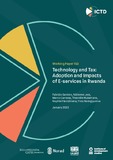| dc.contributor.author | Santoro, Fabrizio | |
| dc.contributor.author | Lees, Adrienne | |
| dc.contributor.author | Carreras, Marco | |
| dc.contributor.author | Mukamana, Theonille | |
| dc.contributor.author | Hakizimana, Naphtal | |
| dc.contributor.author | Nsengiyumva, Yves | |
| dc.date.accessioned | 2023-01-27T09:34:49Z | |
| dc.date.available | 2023-01-27T09:34:49Z | |
| dc.date.issued | 2023-01-16 | |
| dc.identifier.citation | Santoro, F.; Lees, A.; Carreras, M.; Mukamana, T.; Hakizimana, N. and Nsengiyumva, Y. (2023) Technology and Tax: Adoption and Impacts of E-services in Rwanda', ICTD Working Paper 153, Brighton: Institute of Development Studies, DOI: 10.19088/ICTD.2023.001 | en |
| dc.identifier.isbn | 978-1-80470-080-8 | |
| dc.identifier.uri | https://opendocs.ids.ac.uk/opendocs/handle/20.500.12413/17843 | |
| dc.description.abstract | Many low-income countries are increasingly digitising various tax services, usually motivated by efforts to increase efficiency and transparency and reduce the burden of compliance for taxpayers. However, where awareness and adoption are suboptimal, tax e services may produce only partial benefits. In this paper, we examine the adoption of tax e-services in Rwanda, a low-income country which has invested significant resources in digitalising government service delivery and made tax e-services mandatory from 2015. Using a combination of panel survey and tax administrative data, we study the drivers and impacts of e-services awareness and adoption. We find evidence that, before the pandemic, female and less educated taxpayers, with less sophisticated businesses, were left behind in technology adoption, even where e-services were the only option for taxpayers. Exploiting the outbreak of COVID-19 during our data collection, we also study shifts precipitated by a shock that normalised digital transactions. Take-up of e-services is remarkable two years after the pandemic, but still not universal. For those not using the e services the same challenges in access persist – indicating the potential for more targeted policy interventions. Interestingly, technology adoption is not strongly related with filing behaviour, and we study the reasons why non-filers report using the tools and, on the contrary, why active filers report they do not. Also, we do not find any significant impact of e-services adoption on perceived fairness of the tax system and overall willingness to pay, which we hypothesised benefit from e-services. Finally, using evidence from qualitative interviews, we highlight practical challenges in using e-services, such as connectivity problems and slow systems, which undermine the potential benefits. | en |
| dc.language.iso | en | en |
| dc.publisher | Institute of Development Studies | en |
| dc.relation.ispartofseries | ICTD Working Paper;153 | |
| dc.rights.uri | http://creativecommons.org/licenses/by/4.0/ | en |
| dc.subject | Governance | en |
| dc.title | Technology and Tax: Adoption and Impacts of E-services in Rwanda | en |
| dc.type | Series paper (non-IDS) | en |
| dc.rights.holder | Institute of Development Studies 2023 | en |
| dc.identifier.team | Governance | en |
| dc.identifier.doi | 10.19088/ICTD.2023.001 | |
| rioxxterms.funder | Default funder | en |
| rioxxterms.version | VoR | en |
| rioxxterms.versionofrecord | 10.19088/ICTD.2023.001 | en |


